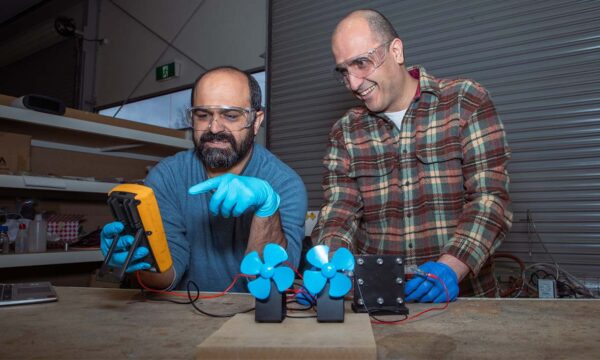RMIT University researchers are planning to develop a ‘megawatt scale’ version of their patented proton battery energy storage system that uses a carbon electrode as a hydrogen store, coupled with a reversible fuel cell to produce electricity.
The RMIT team said it has demonstrated the proton battery as a working device and will now collaborate with Italy-based international automotive component supplier Eldor Corporation to produce a protype unit with a storage capacity that meets the needs of a range of domestic and commercial applications including large-scale storage and electric vehicles.
Lead researcher RMIT Professor John Andrews said the aim of the collaboration is to “scale up the system from the watt to the kilowatt and ultimately to the megawatt scale.”
Andrews, from RMIT’s Sustainable Hydrogen Energy Laboratory (SHEL), said recent design improvements to their proton battery technology meant it is becoming competitive as a carbon-neutral alternative to the dominant lithium-ion technology.
“As the world shifts to intermittent renewable energy to achieve net-zero greenhouse emissions, additional storage options that are efficient, cheap, safe and have secure supply chains will be in high demand,” he said.
“That’s where this proton battery, which is a very equitable and safe technology, could have real value and why we are keen to continue developing it into a viable commercial alternative.”
The RMIT proton battery utilises a carbon electrode to store hydrogen that has been split from water, and then works as a hydrogen fuel cell to produce electricity.

Image: RMIT University
During charging, the carbon in the electrode bonds with protons generated by splitting water with the help of electrons from the power supply. When discharging, protons are released from the carbon electrode and pass through a membrane to combine with oxygen from the air to form water, a reaction that generates power. Unlike fossil fuels, the carbon does not burn or cause emissions in the process.
Andrews said the proton battery avoids the energy-wasting steps of storing hydrogen gas at high pressure, and then splitting these gas molecules again in fuel cells.
“Our proton battery has much lower losses than conventional hydrogen systems, making it directly comparable to lithium-ion batteries in terms of energy efficiency,” he said.
The latest battery’s storage capacity of 2.2 wt% hydrogen in its carbon electrode is nearly three times that of a 2018 prototype, and more than double other reported electrochemical hydrogen storage systems. The researchers said the performance gains have been achieved by design changes that enhance electrochemical reactions in the battery.
“Our battery has an energy-per-unit mass already comparable with commercially-available lithium-ion batteries, while being much safer and better for the planet in terms of taking less resources out of the ground,” Andrews said. “Our battery is also potentially capable of very fast charging.”
The researchers also pointed to the environmental and economic advantages of its technology, saying it does not rely on scarce natural resources and avoids the end-of-life challenges associated with some renewable energy technologies.
“The main resource used in our proton battery is carbon, which is abundant, available in all countries and cheap compared to the resources needed for other types of rechargeable battery such as lithium, cobalt and vanadium,” they said. “There are also no end-of-life environmental challenges with a proton battery, since all components and materials can be rejuvenated, reused or recycled.”
This content is protected by copyright and may not be reused. If you want to cooperate with us and would like to reuse some of our content, please contact: editors@pv-magazine.com.









5 comments
By submitting this form you agree to pv magazine using your data for the purposes of publishing your comment.
Your personal data will only be disclosed or otherwise transmitted to third parties for the purposes of spam filtering or if this is necessary for technical maintenance of the website. Any other transfer to third parties will not take place unless this is justified on the basis of applicable data protection regulations or if pv magazine is legally obliged to do so.
You may revoke this consent at any time with effect for the future, in which case your personal data will be deleted immediately. Otherwise, your data will be deleted if pv magazine has processed your request or the purpose of data storage is fulfilled.
Further information on data privacy can be found in our Data Protection Policy.